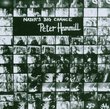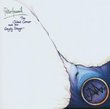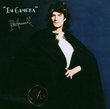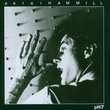| All Artists: Peter Hammill Title: Future Now (Reis) Members Wishing: 1 Total Copies: 0 Label: Caroline Original Release Date: 1/1/2006 Re-Release Date: 11/28/2006 Album Type: Extra tracks, Original recording remastered Genres: Pop, Rock Styles: Progressive, Progressive Rock Number of Discs: 1 SwapaCD Credits: 1 UPC: 094637051528 |
Search - Peter Hammill :: Future Now (Reis)
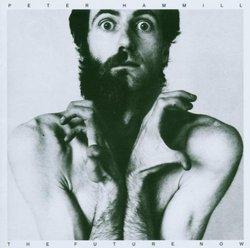 | Peter Hammill Future Now (Reis) Genres: Pop, Rock
|
Larger Image |
CD DetailsSimilar CDs
|
CD ReviewsGet The Future Now allismile0 | Washington, DC | 11/27/2006 (5 out of 5 stars) " The Future Now, released in 1978 is one of Peter Hammill's most distinctive albums in a line of highly distinctive music. To start with, the eye catching album cover of Hammill, half-shaven in a peculiar pose and startled look strikes strong emotions. More importantly the music is stark yet oddly catchy and precise; challenging but a bit more inviting than previous efforts. Peter Hammill is one of the more deftly insightful and introspective singer/songwriters of the last 40 years; the type of thoughtfulness, brilliant wordplay and expression is certainly a rarity of art in this day and age, let alone in the world of rock. As the songwriter and leader of Van Der Graaf Generator as well as numerous solo efforts, Hammill wrote songs that asked all the searching questions about God, existence, relationships, and anything else one might question because of it's seemingly dual nature. Introspective art does not lend itself easily to mass appeal; sometimes too extreme, Hammill's music is not always pretty or agreeable but the integrity and honesty comes out in all it's substance, and purely shows an experience in the human condition. His solo projects tended to delve even deeper into those searches mostly because he wrote, produced and played most of the instruments on those albums. The results were always interesting because although he was not an accomplished musician on all the instruments he played, but he had a way of expressing his depth through inspired need. The Future Now was, in retrospect, an interesting follow-up to the "break-up album" Over. Where Over was straightforward in it's dissection of the feelings that come when a relationship has gone bad, The Future Now turned it's focused analysis and angst towards the world and mankind's arrogance, spiritual hunger, and ambivalence to morality. There isn't a single track on The Future Now that I don't love. Pushing Thirty would have fit in nicely with the punk rock of Nadir's Big Chance- the song is aggressive and full of vigor and sharp wit. The Second Hand, with it's simple bass groove pulsates the lyrics about how fool's can waste their lives. Trappings has a cool folk/rock arrangement, and connects well topically with the simple introspection of Mousetrap and then the violent echoing of Energy Vampires. The lone plaintive ballad "If I Could", possibly a remaining strain of sadness from Over, may not strike one immediately as fitting in with the rest of the album, but on repeated listening the song takes on the form of a serene oasis of desired romance in a troubled world. But the anthem-call of The Future Now brings the music back into the stark cry in the wilderness that seems to be the theme to this album. Still In The Dark mellows things out a little, to contemplate our place in the universe under the interpretation of science. Medieval is a dissonant Gregorian chant that brings to light the issue of when true spirituality is stuffed behind the hierarchy of religion. A Motor-bike In Afrika uses an interesting motorized rhythm and tribal chants that give a pretty distinctive feel to the songs theme. And the final two songs, The Cut and Castaway (Palinarus), partner up quite well. The Cut, with it's backward loops and skewed vocals make for a disorienting sound; then it speeds into the awakening of Castaways electro landscape of waves crashing against the boat as the search for purpose and life twirl upward through the abstract lyrics. The two bonus tracks are interesting, live performances from 1978. The sound isn't very good but the performances are great. I've always likened Peter Hammill's late 70's/ early 80's albums (`78's Future Now through '81's Sitting Targets) to both Peter Gabriel and David Bowie's experimental art rock around that same period. Gabriel and Hammill especially seemed to have paralleled careers up to that point; both fronting highly successful progressive rock bands (VDGG and Genesis) before moving into more personal/introspective and experimental solo albums. Hammill even did occasional back up vocals on a few of Gabriel's albums. The new re-mastered albums (both of Hammill and VDGG) sound amazing, clearing up details and showing the fullness of the music. Highly Recommended. Some other albums of Peter Hammill I would recommend are pH7, Nadir's Big Chance, Over, Fool's Mate, and The Silent Corner And Empty Stage; as for VDGG stuff all the albums are superb but some are very different than others- Pawn Hearts or Still Life are pretty good places to start. " Heaven steven macanka | St. James, NY USA | 10/04/2009 (5 out of 5 stars) "i have seen you preform twice in my life. once with van der graaf generator, once solo. the solo concert i recorded on a cassette recorder. in a small club that long ago closed. it was the "other end". nyc, in the east village, near NYU. once i am impressed with your works, they stick with me always. hope to run into you in heaven, because i will never get a chance on earth. hope you get to see my photography in heaven. i will impress you with my creativity." Prog punks out Steve Peters | Seattle, WA | 08/18/2005 (4 out of 5 stars) "In hindsight it's easy to recognize this as the beginning of a new direction for Hammill. It helps to remember that this was 1978, and the punks had made prog rock, with its pomp and grandiosity, a favorite target. Much of the prog camp felt threatened and dug in their heels, only to go the way of all dinosaurs. Others took the young upstarts seriously and reconsidered their own approach, opting for a new direction that was more raw and stripped down: Peter Gabriel's second album, Robert Fripp's "Exposure" (on which both Gabriel and Hammill appeared as vocalists), and this, the seventh solo album by the Van der Graaf Generator front man.
Recorded in a small home studio with only eight tracks and very few guest musicians, the production here is bare bones. In truth it sounds a bit dated now - some of these synths, drum machines and effects have not aged so gracefully. And his delivery often falls more on the side of declamatory ranting rather than singing (think the Fall's Mark E. Smith), which is too bad because you might miss the fact that Hammill is a terrific singer. The other thing he seems to have borrowed from punk was a renewed sense of outrage. His work had always had a cynical edge, but here it was amped up several notches. The music biz comes in for some scathing criticism, whether record company jerks (Pushing Thirty), infantile pop stars (Trappings), pathetic has-beens (The Mousetrap), creepy fans (Energy Vampires), or the industry in general (The Cut). On the second half he sets his sights on politics, and is just as pissed off. And in the eye of this storm sits If I Could, simply one of the most beautiful lost-love ballads of the era. Hammill can be way over-the-top, but this lack of restraint takes the form of passionate intensity. The man had always been about bearing his soul, but here he seems to tear away the final curtain. It makes you cringe sometimes, but for the right reasons (as did Kevin Coyne at his best). At the same time, there is a certain tenderness and vulnerability that is heartbreaking. The cover image conveys this dynamic nicely: half crazed wildman, half naked poet. I saw Hammill in Los Angeles when he was touring for this album, just him on piano and guitar and Graham Smith on violin. They were ferocious, and I was completely won over." |

 Track Listings (14) - Disc #1
Track Listings (14) - Disc #1